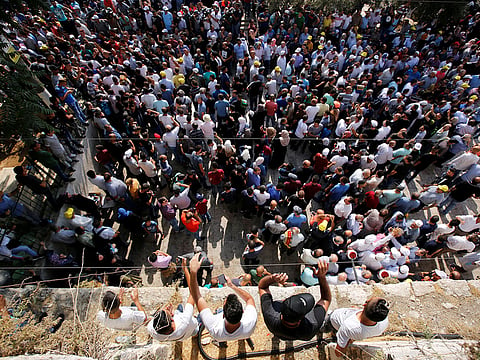Clashes as thousands rush to pray at Al Aqsa
Palestinians celebrate as Israel removes security measures

Occupied Jerusalem: Thousands of worshippers rushed to pray at occupied Jerusalem’s Al Aqsa Mosque in chaotic scenes on Thursday after Israel backed down in the face of 10 days of often-violent unrest and removed security measures it had installed at the sacred site.
At least 37 Palestinians were injured as Israeli occupation forces used sound bombs to control crowds of worshippers surging forth once the last gate Muslims are allowed to use to enter Al Aqsa was opened after a stand-off of several hours.
Israel’s removal of the security measures, including metal detectors and CCTV cameras, marked a significant climbdown by Prime Minister Benjamin Netanyahu. While Palestinians celebrated, political opponents accused him of weakness.
Meanwhile, His Highness Shaikh Mohammad Bin Zayed Al Nahyan, Crown Prince of Abu Dhabi and Deputy Supreme Commander of the UAE Armed Forces, has commended the noble and successful efforts made by King Salman Bin Abdul Aziz, which have fructified into putting an end to the restrictions imposed by the Israeli occupation forces.
In Cairo, the UAE condemned Israel’s practices at Al Aqsa Mosque, calling them a dangerous precedent and hostile action against holy sites and the rights and freedom to practise religion.
At the Arab League’s emergency meeting on Thursday, Sultan Al Jaber, Minister of State and head of the UAE delegation at the meeting, hailed the efforts of the Saudi king.
The head of the Arab League warned that Israeli attempts to control highly sensitive religious sites by force risk igniting a “religious war”.
Israel’s actions are “playing with fire, and will only ignite a religious war and shift the core of the conflict from politics to religion,” Arab League chief Ahmad Abu Al Gaith said.
Earlier, the Israeli regime removed an overhead metal bridge and the railings it had recently installed the holy Muslim site of Al Haram Al Sharif following Palestinian outrage over provocative surveillance measures installed there.
Israeli media reported that all the new inspection devices set outside the entrance to the shrine after the attack were removed.
It was not immediately clear whether surveillance cameras that had been mounted on the wall of Al Haram Al Sharif were also dismantled.
Muslim leaders in Occupied Jerusalem said they were satisfied with the Israeli measures and told worshippers to return to a holy site to pray.
Thousands of Palestinians have been praying in the streets outside the shrine after religious leaders told them not to worship inside the holy compound in protest.
Palestinians danced, chanted “God is Great” and set off fireworks early yesterday after the devices were removed.
Last week, Israel set up metal detectors outside Al Haram Al Sharif, Islam’s third holiest site, which houses the Al Aqsa Mosque, following an attack that killed two Israeli police officers within the compound.
But in response to massive Palestinian protests, Israel on Tuesday removed the metal detectors, saying it would install “new technologies”, including sophisticated surveillance cameras at the site over the next six months. Palestinians rejected the new steps and held daily mass prayers outside the mosque in protest.
UN chief calls for calm
United Nations Secretary-General Antonio Guterres, concerned by the potential risk of escalating violence over the situation in and around Al Aqsa Mosque in Jerusalem, has urged all political, religious and community leaders to refrain from provocative actions and rhetoric.
“I reiterate my concern over the situation in the Old City of Jerusalem. It is essential to fully respect the status quo at the holy sites as before 14 July,” the Secretary-General said in a statement yesterday.
Guterres welcomed the dialogue between Israel and Jordan, in line with Jordan’s special and historic role, and encouraged continued discussions on how to ensure security for both worshippers and visitors.
“I am particularly concerned about the potential risk of escalating violence; urge all political, religious and community leaders to refrain from provocative action and rhetoric; and call on Israel to demonstrate restraint,” the UN chief said.
Al Azhar, the top Sunni Islamic authority, said that on behalf of around 1.7 billion Muslims around the world, it rejects these “irresponsible and provocative” acts.
The prestigious institution also warned the world on staying silent over what it branded as “these aggressive practices that reopen doors for religious wars”.
Al Azhar said it would hold an international conference on Israeli-occupied Jerusalem in late September.
“Occupied Jerusalem and Al Haram Al Sharif will remain inside Muslims’ hearts and their prime cause.”
Israel’s restrictions at Al Haram Al Sharif have infuriated Muslims across the world, triggering street protests.
Arab foreign ministers met in Cairo on Thursday for emergency talks on the crisis.
Palestinians accuse Israel of violating a status quo agreement and trying to expand its control over the Muslim holy site.
Under the agreement, Jews are allowed to visit Al Haram Al Sharif, but not to perform religious rituals there.



